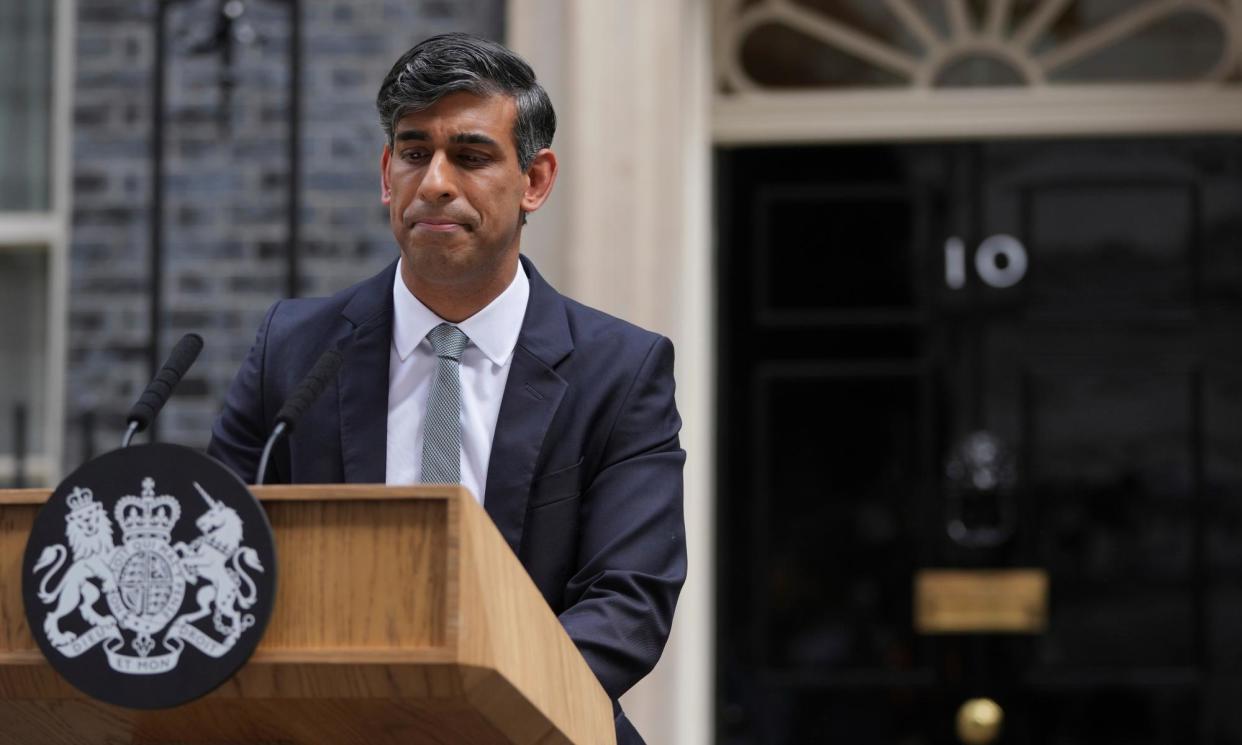‘Goodwill on all sides’: transfer of UK power the antithesis of last US election

“Today power will change hands in a peaceful and orderly manner, with goodwill on all sides,” a gracious Rishi Sunak declared in the small hours of Friday morning as he acknowledged his resounding defeat to Labour’s Keir Starmer.
That may have sounded like a statement of the obvious, given the transition from one British prime minister to the next was certain once the early results had come in, but it stands in sharp contrast to the last US election.
Nearly four years ago, Donald Trump at first refused to concede, and has repeatedly claimed the election in which Joe Biden defeated him was rigged. He sought to overturn the result, incited riots in Washington DC on 6 January 2021 and attempted a coup to retain power unlawfully.
But while Trump and his supporters complained about democracy, in the UK the defeated Conservatives were quick to accept the results and even embraced the fact that their right-of-centre party had suffered its worst election defeat in history. Losing, they emphasised, was a virtue of the British system.
“Don’t be sad, this is the magic of democracy,” the outgoing chancellor, Jeremy Hunt, said overnight in a section of a speech acknowledging his party’s profound defeat that was directed at his own children. “This may seem like a tough day for our family as we move out of Downing Street, but it isn’t.”
As chancellor, Hunt was Sunak’s next-door neighbour at 11 Downing Street. But the British system demands an immediate transfer of power to the election winners, meaning he and Sunak had to move out early on Friday morning to allow Starmer and his Labour ministers to take over their official offices and homes. Both will, however, still be Conservative MPs.
It helps, perhaps, that in the UK, unlike the US, there remains a nominal higher power, in the form of King Charles, the head of state. A defeated prime minister must go to Buckingham Palace to resign and make way for their successor, making displays of petulance or gracelessness less possible.
Britain’s relatively transparent voting system, in which ballot papers are counted by hand in public in relatively small constituencies of about 73,000 voters, also helps stifle complaints. There are no voting machines, the subject of repeated baseless complaints and conspiracy theories in the US since 2020.
As Sunak departed Downing Street, he also had kind words for Starmer after a six-week contest during which each had accused the other of being a danger to the country, including in two head-to-head debates.
“Whatever our disagreements in this campaign, he is a decent, public-spirited man who I respect,” the outgoing prime minister said.
There was a personal acknowledgment of the unique pressures Starmer is likely to face as the head of Britain’s government. “He and his family deserve the very best of our understanding, as they make the huge transition to their new lives behind this door,” Sunak said, a few hours after he had called Starmer to concede.
Another defeated minister, Penny Mordaunt, had hopes of taking over from Sunak as Conservative leader. Instead she lost her marginal seat in Portsmouth North to Labour, meaning she will not be able to run for the job.
But in defeat, she accepted her party did not have the right message. “The public here have good sense, democracy is never wrong,” she said.
Britain’s Conservatives may have been roundly defeated, but respect for the political system remains undimmed.

 Yahoo News
Yahoo News 
